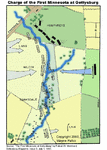renrich
Chief Master Sergeant
Many historians believe that the Battle of Gettysburg in June-July, 1863, was the turning point in the War Between the States. It was the first battle that General Robert E Lee and the Army of Northern Virginia actually lost to the Union Army although the Union declared the battle at Antietam(we call it Sharpsburg) was a victory. Why did the South lose that battle and if they had won it would the US have sued for peace? I hope this is the correct form to start a new thread and that this has not already been discussed earlier.

